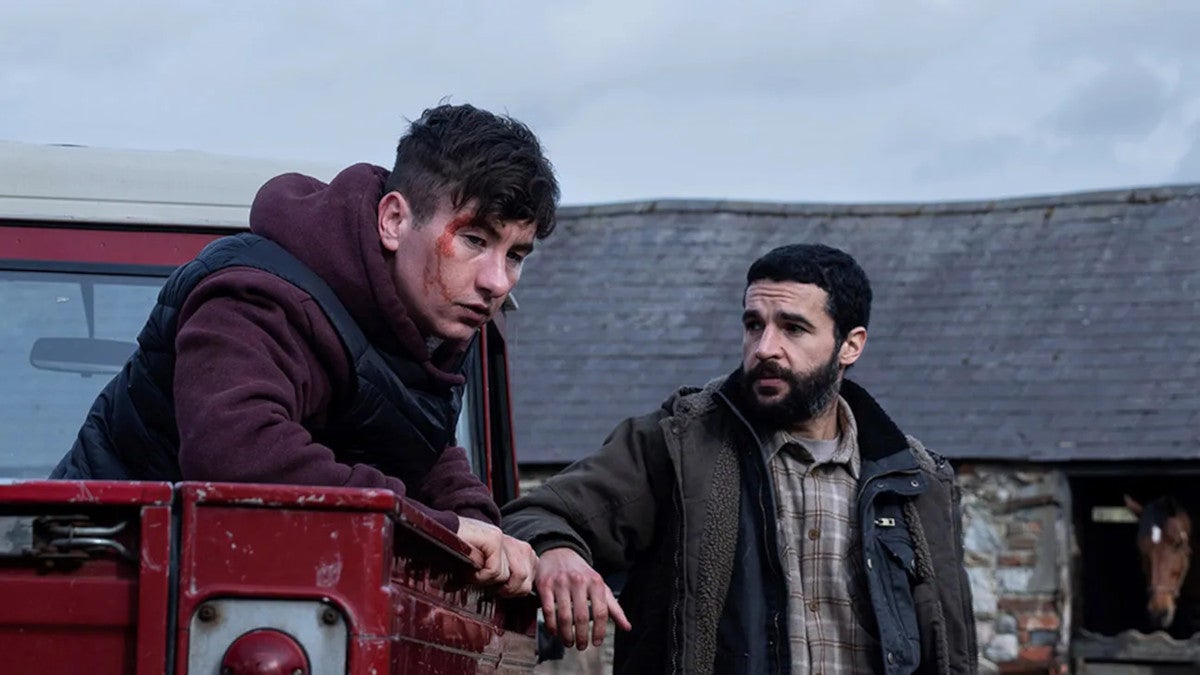Barry Keoghan and Christopher Abbott Save This Movie
There are some actors who, no matter how shaky the film around them may be, can hold your attention and never let go. Lucky for “Bring Them Down,” it has two of the very best in Christopher Abbott (“It Comes at Night”) and Barry Keoghan (“Bird”) to hold this rather bloody mess together. Without them, there’s a good chance the whole thing would simply go to pieces as this is a thriller about two feuding families so perpetually grim it risks becoming a slog. Director Chris Andrews has made a fraught feature debut that drags you through scenes of gruesome violence multiple times over, hammering you over the head with how bleak it all is to an almost comically unsubtle degree. The saving grace of the film’s world comes in the form of its two leads who, despite all the drudgery that they must push through, create something gripping.
That there is a bluntness to the material they’re given prevents everything from cutting quite as deep. You can practically see the more complicated layers of the two men through the eyes of the performers alone, but they’re both left staring at a story that almost stubbornly refuses to excavate them. It’s a film of pain, brutality and little else, reducing the more complicated nature of the human experience to whatever it needs to keep the characters at each other’s throats.
The film, which premiered Sunday at the Toronto International Film Festival, follows the troubled duo of Michael (Abbott) and Jack (Keoghan) who find themselves living in close proximity to each other in remote Ireland. They also remain increasingly hellbent on destroying the other’s world. We get introduced to this corner of the country via a flashback of a horrifying car crash where Michael drives recklessly fast. This leaves his mother dead and his now ex-girlfriend, Caroline (Nora-Jane Noone), scarred for life. Years pass and she has married a fellow sheep farmer, Gary (Paul Ready), ultimately having a child: Jack. Left alone with little in his sad life besides his own sheep, Michael cares for his disabled, yet often cruel, father (Colm Meaney).
If you thought this sounded grim, that’s merely the beginning of a meandering descent into darkness where you’re left wondering who all these people are when not being driven to extreme violence. At the end of the film, despite looping back on itself to recontextualize the story, these questions remain unanswered.
The inciting incident involves young Jack stealing two of Michael’s sheep and attempting to pass them off as his own so his family can sell them. “Bring Them Down” then traces the cracks created by this act that grow larger with every moment. There are yet more car accidents, plenty of horrifying sounds of sheep screaming, and confrontations that turn bloody. There is a tragic inevitability to all this, but that can’t give the film the more the nuanced texture it is desperately crying out for. Alas, it’s a movie that’s never quite multifaceted enough to fully move you despite how much it yells.
What prevents “Bring Them Down” from a forgettable existence is Keoghan and Abbott, with the latter again showing just how commanding he can be in even the superficial scenes. For large stretches, there is limited dialogue and we just are left accompanying Michael as he goes about his day. The way that his stare can cut right through the other characters is quietly chilling, just as you see the slivers of charisma that have been buried under generations of hard living. Keoghan plays a younger man who’s just getting a taste of this and thus has more hope, though we can see this too is likely to be dashed to pieces if he even lives through the day.
It’s their performances that give so much more to the experience that otherwise remains stuck in its march of misery. It’s not a problem that the setting and stakes are small scale, as this could work perfectly well if there was a greater emotional punch to it all. It doesn’t have to be happy, but surely people have more to them than the agony they inflict on each other. If Andrews were to give that devastation something approaching depth, all of this would land so much harder. You can feel the filmmaker straining for this and almost grasping it when the film shifts into being more of a “Rashōmon”-like experience, though its emotionally repetitive nature also drags it down.
By the time all the chips have fallen, “Bring Them Down” does gesture towards the deeper and more complex film it was hoping to be. It then holds this in its grasp just enough for it to be something you can’t fully dismiss, but much still slips away as the bloody hands lose their grip.









